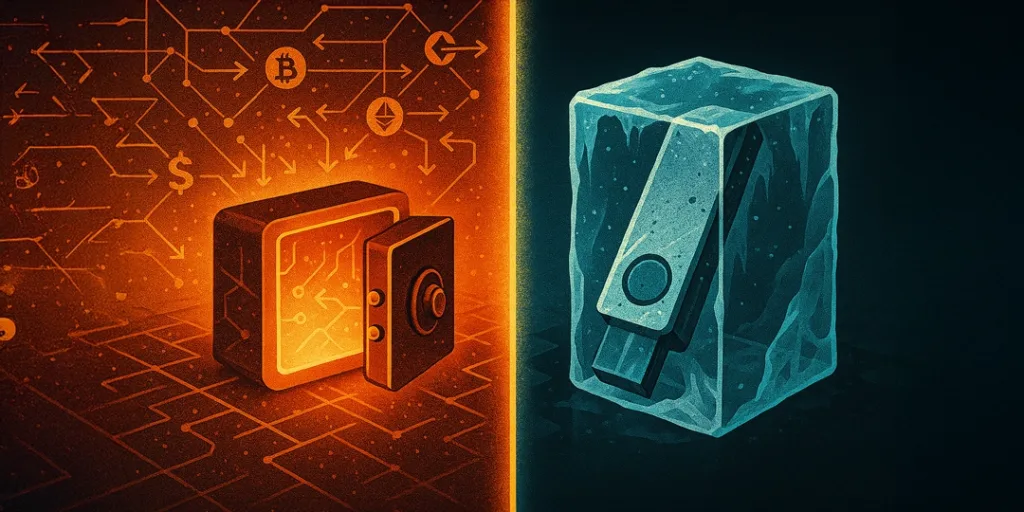A crypto wallet secures the private keys required to access and manage your digital assets. Think of the blockchain as an immutable public ledger; your wallet serves as the secure container safeguarding the cryptographic keys to your holdings.
Your wallet doesn’t store coins like a physical wallet. Instead, it safeguards your private keys, digital codes that prove you own crypto on the blockchain. If blockchain is a bank ledger, your wallet is the key to your safety deposit box.
Does losing your keys mean losing your crypto? Absolutely! Read on to learn more!
Hot wallets: Your spending account
Hot wallets live online. Think of the MetaMask plug‑in in your browser, Trust Wallet on your phone, or the wallet built into an exchange account. Because they’re always connected, you can jump straight into trades, DeFi apps, NFTs, or everyday spending without any fuss. They’re free to install, simple for newcomers, and hook into dApps with a single click.
The downside is security. Your private keys sit on a device that’s constantly on the internet, so they’re easier targets for viruses, phishing links, or exchange hacks. In short, hot wallets trade a bit of safety for the speed and ease we all enjoy, so it’s wise to keep only your day‑to‑day funds in them.

Cold wallets: Your Fort Knox
Cold wallets are physical devices like Ledger or Trezor, or offline tools such as metal seed plates, designed to keep your private keys entirely offline. They offer near-zero hack risk since keys never touch the internet, making them ideal for securing large, long-term holdings (“HODLing”).
Additional security layers, like PIN codes and passphrases, further fortify your assets. The trade-off? Like accessing a bank vault, transactions require a physical connection to sign, adding steps but delivering unmatched protection. As seasoned investors say, Cold wallets are insurance for crypto you can’t afford to lose.
Where hot and cold wallets overlap
- Generate public addresses so you can receive crypto.
- Let you sign transactions (the cryptographic proof that unlocks your funds).
- Rely on a 12‑ to 24‑word recovery seed that can restore the wallet if the device or app is lost.
- Increasingly supporting multiple chains and tokens under one roof.
In short, they do the same job—the difference is how and where they store your keys.
Key differences at a glance: Hot wallets vs cold wallets
| Feature | Hot Wallet | Cold Wallet |
| Internet connection | Always/Frequently online | Kept offline; only connects to sign |
| Best for | Daily transactions, DeFi, NFTs | Long‑term storage, large balances |
| Speed | Seconds to send | Minutes (connect device, confirm) |
| Security risks | Malware, phishing, exchange hacks | Physical theft, seed‑backup loss |
| Typical cost | Free (software) | $50–$300 (hardware); paper is free |
| Examples | MetaMask, Phantom, Coinbase app | Ledger Nano S +, Trezor Model T, metal seed plates |
Final thought: Which wallet should you use?
Smart strategy? Use both; your hot wallet is like your Checking account, while your cold wallet is like your Savings account. If you trade daily, transfer only what you need to your hot wallet. The rest stays cold.
Just like you wouldn’t stash all your cash in your backpack, don’t keep all your crypto online. Start with a hot wallet for learning, then invest in a cold wallet as your stack grows. Your future self will thank you.
FAQs: Hot wallets vs cold wallets
- Q: Can I use just one wallet?
A: Technically yes—but it’s like using one key for your house, car, and safe. Risky! Split funds between hot (daily use) and cold (savings). - Q: Are hardware wallets worth $100?
A: If you hold >$500 in crypto, absolutely. Cheaper than losing it all to a hack. - Q: Can hot wallets ever be secure?
A: Yes! Use 2FA, avoid phishing links, and never share seed phrases. But never store large sums. - Q: What if my cold wallet breaks?
A: Your crypto lives on the blockchain, not the device! Restore it with your seed phrase on a new wallet. - Q: Can I send crypto directly from cold to hot wallets?
A: Yes. Connect your cold wallet, sign the transaction, and send funds to your hot wallet’s public address.





